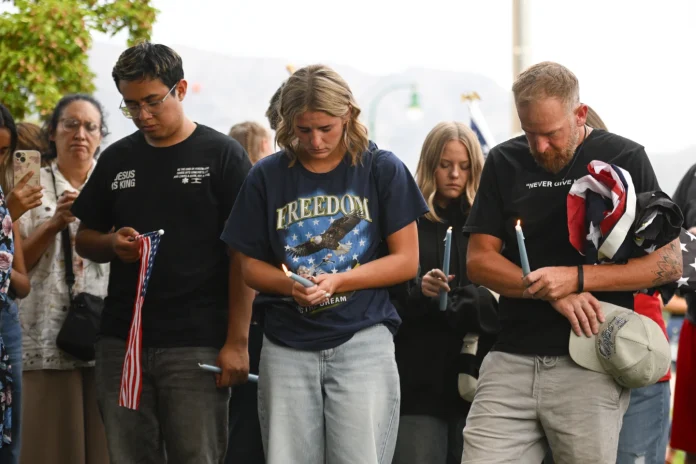Just weeks into the fall semester, a crowd gathered around a white canopy on a grassy college courtyard. They were eager to hear what the speaker beneath it had to say. It was a typical university scene, with its promise of the exchange of ideas and debate, except in one way: its size.

This speaker was Charlie Kirk, one of the most influential voices in President Donald Trump’s “Make America Great Again” movement, and the event Wednesday at Utah Valley University drew more than 3,000 people. Backpack-toting students watched from surrounding buildings as Kirk, wearing a white T-shirt that said “Freedom,” tossed red MAGA caps, Frisbee-style, to his fans.
He took his place beneath the canopy, the slogans “The American Comeback” and “Prove Me Wrong” emblazoned across it. He picked up a handheld microphone and he began to address the audience.
As he answered a question about gun violence, a single shot cracked.
Campuses were Kirk’s frequent stops
Kirk, 31, is a podcaster and the founder of the conservative youth group Turning Point USA. He has embraced Christian nationalism, often making provocative statements about gender, race, religion, and politics. For example, he once said it was worth having “some gun deaths every single year” to preserve the Second Amendment and protect other “God-given rights.”
These views have made him a polarizing figure, especially on college campuses. Unlike many public speakers, Kirk actively seeks out confrontations, often debating progressives and inviting audiences to challenge his positions. As a result, his appearances regularly spark backlash.
Wednesday’s event followed that same pattern. Thousands signed online petitions urging Utah Valley University to cancel his talk. Another speech scheduled for Sept. 30 at Utah State University has drawn similar protests.
One petition read, “As students at Utah Valley University, we have come to cherish an environment that strives for inclusivity and diversity.” It continued, “Yet, the planned speaking engagement of Charlie Kirk threatens this ideal. His presence and the messages he delivers stand in contrast to the values of understanding, acceptance, and progress that many of us hold dear.”
The university responded by affirming its “commitment to free speech, intellectual inquiry, and constructive dialogue.”













